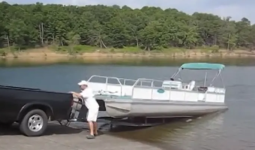It's doubtful there's any stored codes for it. The ECU on your Mercury engine is pretty basic, it is not near as sophisticated as modern automotive systems. It will log a hard sensor fault, but not something like a bent rod.
If you have not been in contact with the shop that did the winterizing, and they don't know about it, just wander in and ask sort of nonchalant what's involved with winterizing your four-stroke outboard. See if you can get some info on what procedure they use, find out if they do things like spraying fogging oil in a running engine and flood it with oil until it quits.
And keep in mind these engines are not tough like the old two-strokes. I mean, the local Mercury dealer here has a stack of four-stroke power heads on a pallet that has failed either under warranty or not - everything from tossed rods and a hole in the block, dropped valves, bent rods, pistons that broke and the small end of the rod beat the crap out of the cylinder and busted it, and every single one they blame on water getting in the exhaust, or water getting in the oil. About a month ago I was there and looking at one that tossed a rod - it was a 90 but this is the same powerhead you got. They said it tossed the rod because water got in the oil. Cripes, I could see thru the hole in the block that the big end of the rod was still on the crank journal - the rod bearing had not failed. The rod beam broke and the crank flung it thru the block. I've been building engines for better than 40 years, and I'm not quite that gullible. I pointed this out to the tech standing there. Oh no, they teach 'em right in service school in Fon Du Lac that if it breaks, water got in.
Mercury cheapened their modern four-strokes up to get the weight down so they can claim they're 20 lbs lighter (or whatever) than their competitors. They are very fragile (and complex and expensive) pieces of machinery and it don't take much to break one, compared to what we've had before the great four-stroke craze in the early part of the last decade.
Admittedly, a bent rod is not Mercury's fault unless it was caused by an injector that stuck open and filled the cylinder with gasoline (and I've seen that too). But I hate to tell you that these engines are very chincy-built just to get the weight down, compared to something like a Honda four-stroke. The Mercury Boys will tell you a Honda is SLOW because it's so heavy - they teach 'em that in service school too. But if you can break a Honda outboard it was likely in a crash on the highway, and not on the lake.






















